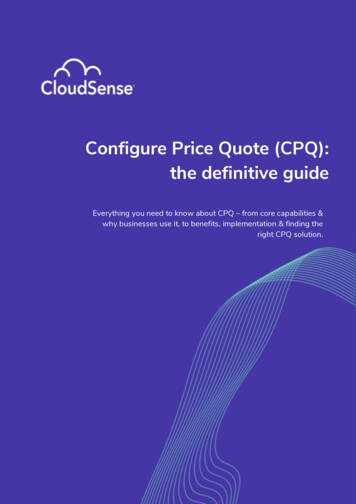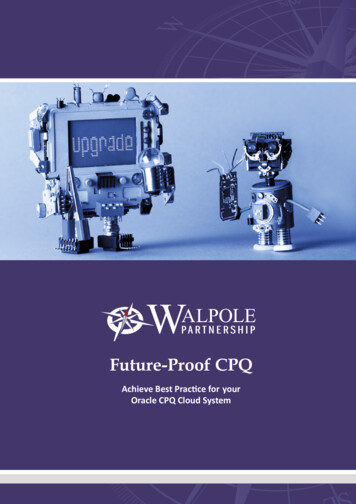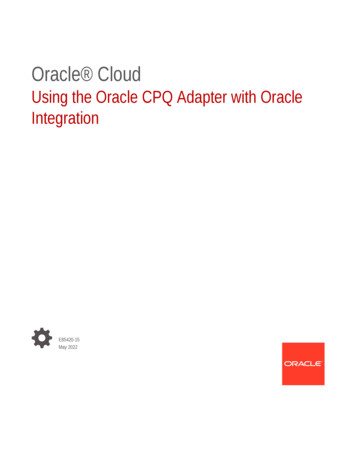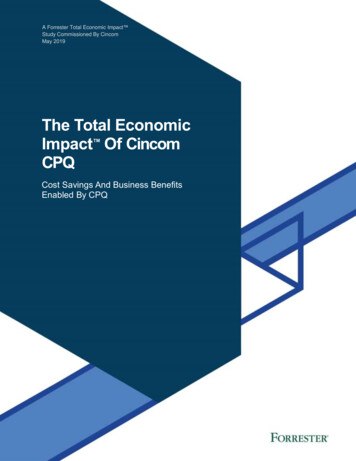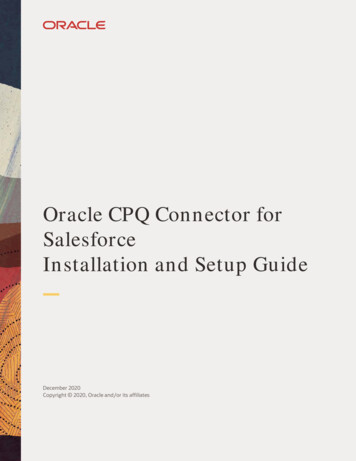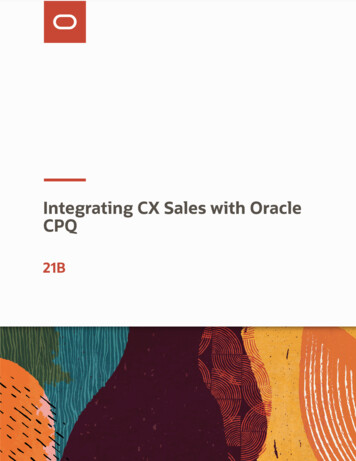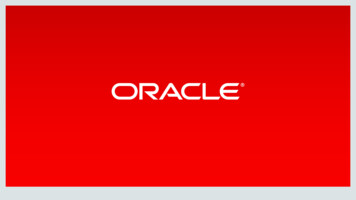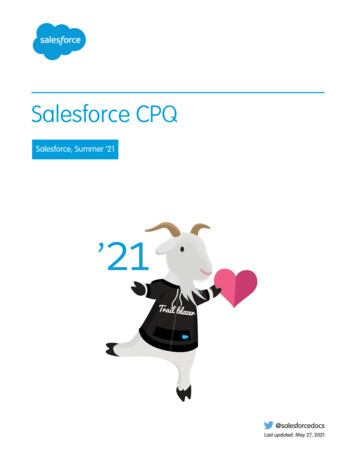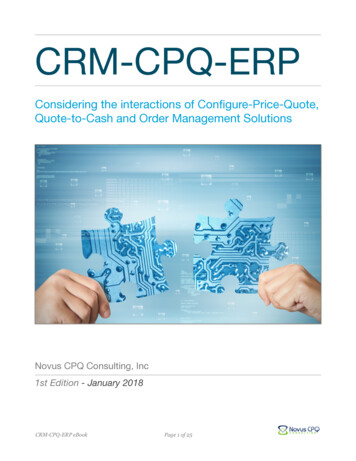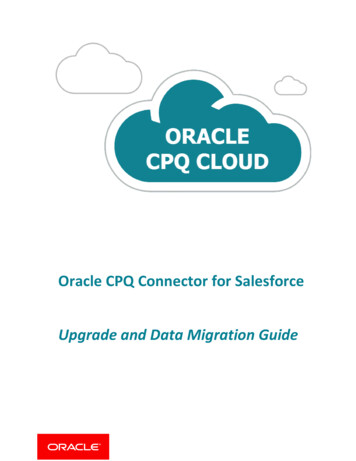
Transcription
Oracle CPQSecurity GuideMarch 2022Copyright 2022, Oracle and/or its affiliates
TABLE OF CONTENTSIntroduction . 2Administration Best Practices . 2Passwords . 2BML . 3Custom Javascript . 4User Type Best Practices . 5Commerce Best Practices . 6Secure Attributes . 6Workflow . 6Approvals . 7Integrations . 7File Manager . 7Home Page Best Practices. 8API Programming Best Practices. 8Data Table Best Practices . 9Data Use Best Practices . 9Oracle CPQ Security Guide1
INTRODUCTIONOracle Configure, Price, and Quote (CPQ) enables companies to streamline the entire opportunity-to-quote-toorder process, including product selection, configuration, pricing, quoting, ordering, and approval workflows. TheOracle CPQ product provides a flexible, scalable, enterprise-ready solution ideal for companies of all sizes that sellproducts and services across direct, indirect, and e-commerce sales channels.Oracle CPQ is a highly customizable product and provides administrators with numerous configuration options.The purpose of this Security Guide is to provide administrators with tips and best practices to aid in the securedeployment and usage of Oracle CPQ.ADMINISTRATION BEST PRACTICESOracle CPQ Administration Platform, often referred to as the Admin Home page, is the area within Oracle CPQused by administrators to set up a secure configuration for Oracle CPQ. Oracle recommends administratorscomply with the administration best practices identified within this section.PasswordsAdministrators have the ability to change password security settings for all Oracle CPQ user accounts from theGeneral Site Options page. They can specify the number of login attempts allowed before locking a user accountand the number of days a password is valid before it expires.Complete the following steps:1. Open the Oracle CPQ Administration Platform.2. Under General, click General Site Options. The Options – General page opens.NOTE: Beginning in Oracle CPQ 21B, support for low complexity password strength is discontinued and thePassword Strength selection is removed from the Options – General page. Going forward, all new passwordsrequire 8 – 31 characters, including at least one uppercase letter, at least one number, and at least onespecial character. This change will impact end users the first time they reset their password following theOracle CPQ 21B upgrade.3. Use the Number of Login Attempts field to specify the number of login attempts allowed before lockinga user account. Refer to your company policy and populate this field with the minimum value referenced.If not addressed in your company policy, Oracle recommends setting the value to 3.4. Use the Password Expires After field to specify the number of days after which the password expires.Refer to your company policy and populate the value with the minimum value referenced. If notaddressed by your company policy, Oracle recommends setting the value to less than 90 days. This fieldcannot be left blank.5. Use the Password Reuse After field to specify the number of days after which an expired password canbe reused. Refer to your company policy and populate this field with the maximum value referenced. Ifnot addressed in your company policy, Oracle recommends setting the value to 365 days.6. Use the Password Reset Link Expires After field to specify the number of minutes the reset link isavailable to the user. Refer to your company policy and populate this field with the minimum valuereferenced. If not addressed in your company policy, Oracle recommends setting the value to 30.Oracle CPQ Security Guide2
7. Administrators can set the Password Expiry Override For Web Services Only User to Yes or No, thedefault setting for this is No. This option specifies if Web Services Only user passwords follow the CPQsite password options. Oracle recommends setting this value to No. Yes - Passwords do not expire for SOAP and REST API Web Services users. No - SOAP and REST API Web Services user passwords follow the password options set for all userson the CPQ site.8. Use the Account Lockout Time field to specify the number of minutes an account is automatically lockedafter the number of invalid login attempts is exceeded. Once the lockout time has passed, the account isautomatically unlocked and available for user login. Refer to your company policy and populate this fieldwith the maximum value referenced. If not addressed in your company policy and you want to implementthis feature, Oracle recommends setting the value to 30. If you do not want to implement this feature, setthe value to 0.BMLBigMachines Extensible Language (BML) is a powerful scripting language used by administrators to customizethe functionality of Oracle CPQ. Oracle recommends that administrators who write BML comply with thefollowing best practicesBEST PRACTICEDESCRIPTIONBMQLBMQL takes in a query string that can have inputs passed in as defined variables,which is the Oracle recommended best practice. While administrators can also build thestring with variables hardcoded in the string, Oracle does not recommend this methodas the query string has a higher likelihood of being vulnerable to attack.InputOracle recommends sanitizing all BML input before the input goes through sensitiveprocessing.For example: If using a numeric drop-down for input in BML, do not assume thecontent coming in is from the drop-down. If you take content and, for example, do aloop based upon this, an attacker could send in an input of more than a million,potentially compromising site stability.HTTPOracle CPQ Security GuideOracle recommends using URL Data methods to make HTTP calls from BML. URL datamethods can make an HTTP call to a third party site and is an easy way to dointegrations.3
NOTES: When sending sensitive content, use HTTPS current with industry standards and not HTTP when making thesecalls. If the URL and the parameters list comes from user content, they must either come from administratordefined values or undergo validation. By not complying with this best practice, Oracle CPQ servers become anattack vector to other sites and issues occur with Oracle CPQ deployments. Oracle recommends putting in a timeout value for every HTTP call made from BML, so there are no hangingthreads waiting for server responses when a third party side has performance problems.Custom JavascriptWhile Oracle CPQ does not endorse or guarantee the use of JavaScript customizations, we recognize that somecustomers have extended the Oracle CPQ. Customizations may conflict with new Oracle CPQ platform features,data may be corrupted or lost, maintenance and support may be difficult, cross-browser support must be verified,performance may be impaired, and testing is required for each upgrade. Customers should consider carefully therelative benefits of JavaScript customizations in light of the associated risks.If customers have added custom JavaScript that leverages the Document Object Model (DOM) structure orspecific elements, classes or IDs, this customization should be thoroughly tested and may require refactoring.Oracle CPQ Update 21C and 21D, which supported JET v8.3.0, included changes to the following DOM structures.Unless JavaScript customizations were modified to address this change, the change will very likely impactexisting JavaScript customizations: JET widget CSS applies to elements with class that starts with '.oj'. Oracle JET reserves this as anamespace. As such all customized elements that include '.oj' should be reviewed, tested, and refactored.Going forward no customized elements should include '.oj' in order to prevent future issues.Oracle CPQ 22A and later supports JET v10.0.0. Refer to Modifications to Known Behavior for JET 10 and InternetExplorer 11 known behavior differences.Refer to the following resources for more information: Oracle CPQ Administration Online Help Style & Templates JavaScript Customizations for JET UIs Oracle CPQ JET Configuration and Transaction UI: Refactoring Existing JavaScript Customizations JavaScript Extension Toolkit and JET v10.0.0 Release Notes(Doc ID 2490016.1)Beginning in Oracle CPQ 22B, users must opt in Beginning in Oracle CPQ 22B, administrators must opt in to addcustomized advanced HTML/JavaScript to the site. A new User Profile preference checkbox setting,JavaScript/Advanced HTML Opt-In, must be selected in order for customized JavaScript or Advanced HTMLscripts to be added or modified.If a user attempts to add custom advanced HTML without this setting selected, an error message displaysindicating the opt-in setting is required. When this occurs the JavaScript/HTML content is blocked from entry.The user can remove the JavaScript/Advanced HTML content or opt in. This reminds users of the risksassociated with JavaScript/Advanced HTML customizations and they must agree to take responsibility for therisks to their site.To access the Opt-in for JavaScript/Advanced HTML setting, perform the following steps:1.2.Navigate to the My Profile page by clicking the My Profile icon or selecting My Profile from the UserNavigation Menu.Select the JavaScript/Advanced HTML Opt-In checkbox within Preferences.Oracle CPQ Security Guide4
3.Click Apply or Update.USER TYPE BEST PRACTICESOracle CPQ offers multiple user types for different roles. Oracle recommends assigning users to the correct usertype, so users only have access to the functionality they need. This is based on the principle of least privilege(PoLP). You can find more information on this concept at Host Company refers to the hosting company, which is designated as FullAccesswithESales company type. Thiscompany hosts companies, called Partner Organizations, which assist the Host Company in achieving its goals.As described in the following table, all host company users fall into two general categories of user type: adminusers and sales users.Oracle CPQ Security Guide5
USER TYPEDESCRIPTIONAdmin UsersAdmin users are responsible for implementing and maintaining an Oracle CPQ site.They have access to both the Oracle CPQ Administration Console and the user side ofOracle CPQ.Administrative functions can only be performed by SuperUser or FullAccess users.Admin functions include making changes to Configuration (adding attributes, creatingrules, etc.) and modifying Commerce Processes.Sales UsersSales users only have access to the user side of Oracle CPQ and use it to configureproducts, create Transactions, and create proposal documents.There are three types of sales users: SalesAgent, ChannelAgent, RestrictedAccess, andSales Agent. For additional information, refer to the Oracle CPQ Administration OnlineHelp.A user can be setup to have Web Services only access. A Web Services Only user is granted access to make WebServices calls to the Oracle CPQ site but is not permitted to login through the web interface. Web Services onlyusers are commonly used when integrating Oracle CPQ to other applications.COMMERCE BEST PRACTICESCommerce is one of the foundational pillars of Oracle CPQ and is where a configuration turns into a quote, whichcan flow through approvals and into other systems. Commerce uses secure attributes, workflows, and approvalsto help process data in a secure way.Secure AttributesSecure attributes are available to administrators when they need information encrypted in the system that 1)should not be persisted in Oracle CPQ or 2) must be encrypted. Encryption is asymmetric.With a Secure Attribute field on a Commerce layout, Oracle CPQ can capture values as users input them. OracleCPQ masks the entry as if it were a password. In addition, Oracle CPQ uses the Java RSA encryption standard toencrypt the data without ever storing the original value in Oracle CPQ. Oracle CPQ only stores the masked data,which cannot be converted back to its original value.When an Oracle CPQ action (such as Save) is active, the encrypted data is temporarily stored in memory and canbe transferred to the customer’s system via an integration call from Oracle CPQ. The customer’s system, locatedin their controlled database, handles data storage, security, and any further encryption and decryption.Oracle CPQ encryption uses standard Java libraries, including RSA standard with Optimal Asymmetric EncryptionPadding. The public key (an SSL certificate with a minimum key length of 2048) must be uploaded to theCommerce process.WorkflowAdministrators can utilize user roles to customize views and deny access to attributes and actions when a quoteenters specific states. Layout customizations allow administrators to remove sensitive attributes from theinterface when non-cleared users can view the quote.Oracle CPQ Security Guide6
A workflow consists of steps and their participant profiles, which define document permissions, routing, and thedifferent states of a Transaction. Commerce processes can have any number of workflow steps.For example: A Request for Quote (RFQ) process could have steps such as "Submitted", "Quoted", "Accepted","Declined", and "Expired". These steps could transition a Transaction from an RFQ document, to a Quotedocument, to a purchase order document.Workflow steps use profiles to define access rights, transition notifications, and Transaction views. TheCommerce system automatically creates a default profile for each workflow step. Administrators can customizethe default profile and create additional ones to support different Transaction access rights.Administrators grant profile permissions based on user access type, user group, or previous performers. Inaddition to these permissions, administrators can also add auto-forwarding rules to workflow steps to support acollaborative sales environment where multiple users can work on the same Transaction. Administrators cancreate auto-forwarding rules for each workflow step and base them on any number of criteria.NOTE: Use the defined user roles and steps to restrict all sensitive attributes from the view of users with no needto view them.ApprovalsThe approval process defines how the business hierarchy signs off on the validity of quote, allowing the quote toproceed to the next step. Approvers can evaluate quote values during the approval process to ensure the valuesare as expected.IntegrationsIntegrations with some third party sites use integration XSLs. In Commerce, this transforms the quote data andsends the transformed object to the connected CRM system. These XSLs can use XSL library functions and thefull functionality of the language.NOTE: Non-standard extension libraries are not supported.File ManagerFile Manager is an integral part of Oracle CPQ. Customers can upload files to the File Manager, organize files intofolders, and access files from anywhere on the Internet. The File Manager can store external images, JavaScriptfiles linked to various areas on the site, CSS Stylesheets for Configuration flow templates, and Excel spreadsheetsused to hold master data.Unless administrators apply folder security, the File Manager files are available publicly. Oracle recommendsadministrators place all sensitive content in a secure folder. Administrators can designate any folder they haveadded to File Manager as secure. Once an administrator designates a folder as secure, the security settings applyto all files within that folder.Complete the following steps:1. Open the Oracle CPQ Administration Platform.2. Under Utilities, select File Manager. The File Manager opens3. Select a folder from the Folders panel.4. Select the Folder Security Setting checkbox to make the folder secure.Oracle CPQ Security Guide7
5. Click Save.HOME PAGE BEST PRACTICESAdministrators can customize the Oracle CPQ home page and use features on a customer’s Oracle CPQ site toapply custom headers and footers, which are placed on the site without Oracle CPQ processing. Oracle advisesadministrators to carefully place content in the header and footer, ensuring not to expose insecure orperformance impacting JavaScript.The home page can also have access restrictions applied to various elements. In the administration section on thehomepage link, administrators can introduce smart restrictions based upon user account values, allowing modelsto shown to specific users only if they are in a specific user group. In this way, homepage views are customized tothe permission of each user.NOTE: Domain allow listing for cross origin JavaScript calls is not setup for Oracle CPQ by default. If thefunctionality is needed for an Oracle CPQ site, open a Service Request (SR) on My Oracle Support.API PROGRAMMING BEST PRACTICESOracle CPQ offers REST and SOAP APIs for interacting with Oracle CPQ objects. The Oracle CPQ AdministrationOnline Help contains documentation about both the REST and SOAP APIs.REST APIs allow authentication via the following options, listed in preferred order: an OAuth token, BaseAuthheaders, or a session cookie. Oracle does not recommend BaseAuth as the integration site is responsible forsecurely managing the credentials. Using a session cookie is a browser-based authentication mechanism whereREST calls are usually server-to-server. For this reason, Oracle does not recommend using a session cookie. Thepreferred usage for SOAP APIs is to use a WS-Security header for login.BEST PRACTICEDESCRIPTIONPassword StorageRegardless of the authentication method used, administrators must securely store thesecret values for authentication. If using BaseAuth, administrators must keep usercredentials safe on a trusted server. If using OAuth, administrators must keep the clientsecret safe on the callback server. Any compromise of these credentials should triggeran immediate credential change or deactivation of the user or client record.Client RegistrationRegistration of OAuth clients occurs via a REST endpoint. Administrators shouldcorrectly choose the time to live values for access and refresh token time to live values.The default values are 30 minutes and 24 hours respectively. Oracle recommends notsetting the access token lifetime at more than an hour.HTTPS OnlyOracle CPQ only responds over HTTPS calls, which are the only calls Oraclerecommends making. If attempting to pass credentials or sensitive information overHTTP, the data can be read from intermediate servers processing the request on itsway to Oracle CPQ. To prevent unintentional information disclosure, Oracle stronglyrecommends that request attempts do not follow this transport method.Oracle CPQ Security Guide8
BEST PRACTICEDESCRIPTIONOauth ProviderIt is important that only trusted clients are allowed access to Oracle CPQ resources.Since Oracle CPQ implicitly trusts OAuth Provider credentials as a trusted identity andpasses along that signature authority, ensure that only trusted services have access toget signature from the OAuth Provider. With this in mind, also ensure proper securityprivileges are established for the OAuth provider.NOTES: Oracle CPQ supports the use of REST APIs for communication between clients and servers. In general, Oraclerecommends making calls to support standalone user interfaces or server processing of Oracle CPQ objects.Most REST calls are synchronous and all REST calls are stateless. REST calls tax the Oracle CPQ system in an equivalent manner to a user performing the same operationthrough the Oracle CPQ interface. Oracle recommends administrators make sure the system is not floodedwith REST calls. To maintain a lighter load of REST calls, request only the portion of attributes needed for extraprocessing in the REST endpoint. For additional information, refer to the REST metadata documentation.DATA TABLE BEST PRACTICESData tables allow for the storage of spreadsheet like data in the system. Customers upload a large amount of datainto Oracle CPQ data tables for use in Oracle CPQ processing. Since the data can contain sensitive information,Oracle CPQ allows administrators to impose security layers on the data tables.Secure columns encrypt the data entered into them and provide a good way to keep confidential information (i.e.passwords to external systems, secret keys, or tokens) in data tables. Once entered, the data remains encryptedin the Oracle CPQ database and is only accessible via BMQL.Administrators can use the secure data type option for new columns in both new and existing data tables.Confidential client credentials are required to connect to other Oracle products and applications. Secure datatable columns provide a method for securely storing confidential credentials in Oracle CPQ. Secure columnsalways store the encrypted form of the data in the data table. The only way to access this data in its original,decrypted form is through BMQL.NOTE: Secure columns are not designed to store very sensitive data such as credit card numbers or social securitynumbers.DATA USE BEST PRACTICESWithin the Oracle CPQ application, session cookies are maintained only for an active Oracle CPQ session. Oncethe active session is closed, tracking of cookies ends and all cookie-related data is deleted and not retained withinthe Oracle CPQ application.Oracle CPQ Security Guide9
CONNECT WITH USCall 1.800.ORACLE1 or visit oracle.com.Outside North America, find your local office at acletwitter.com/oracleCopyright 2022 Oracle and/or its affiliates. All rights reserved.This software and related documentation are provided under a license agreement containing restrictions on use and disclosure and areprotected by intellectual property laws. Except as expressly permitted in your license agreement or allowed by law, you may not use,copy, reproduce, translate, broadcast, modify, license, transmit, distribute, exhibit, perform, publish, or display any part, in any form, orby any means. Reverse engineering, disassembly, or decompilation of this software, unless required by law for interoperability, isprohibited.The information contained herein is subject to change without notice and is not warranted to be error-free. If you find any errors,please report them to us in writing.If this is software or related documentation that is delivered to the U.S. Government or anyone licensing it on behalf of the U.S.Government, then the following notice is applicable:U.S. GOVERNMENT END USERS: Oracle programs, including any operating system, integrated software, any programs installed on thehardware, and/or documentation, delivered to U.S. Government end users are "commercial computer software" pursuant to theapplicable Federal Acquisition Regulation and agency-specific supplemental regulations. As such, use, duplication, disclosure,modification, and adaptation of the programs, including any operating system, integrated software, any programs installed on thehardware, and/or documentation, shall be subject to license terms and license restrictions applicable to the programs. No other rightsare granted to the U.S. Government.This software or hardware is developed for general use in a variety of information management applications. It is not developed orintended for use in any inherently dangerous applications, including applications that may create a risk of personal injury. If you usethis software or hardware in dangerous applications, then you shall be responsible to take all appropriate fail-safe, backup,redundancy, and other measures to ensure its safe use. Oracle Corporation and its affiliates disclaim any liability for any damagescaused by use of this software or hardware in dangerous applications.Oracle and Java are registered trademarks of Oracle and/or its affiliates. Other names may be trademarks of their respective owners.Intel and Intel Xeon are trademarks or registered trademarks of Intel Corporation. All SPARC trademarks are used under license and aretrademarks or registered trademarks of SPARC International, Inc. AMD, Opteron, the AMD logo, and the AMD Opteron logo aretrademarks or registered trademarks of Advanced Micro Devices. UNIX is a registered trademark of The Open Group.This software or hardware and documentation may provide access to or information about content, products, and services from thirdparties. Oracle Corporation and its affiliates are not responsible for and expressly disclaim all warranties of any kind with respect tothird-party content, products, and services unless otherwise set forth in an applicable agreement between you and Oracle. OracleCorporation and its affiliates will not be responsible for any loss, costs, or damages incurred due to your access to or use of third-partycontent, products, or services, except as set forth in an applicable agreement between you and Oracle.
Oracle CPQ product provides a fle xible, scalable, enterprise-ready solution ideal for companies of all sizes that sell products and services across direct, indirect, and e -commerce sales channels. Oracle CPQ is a highly customizable product and provides administrators with numerous confi guration options.
